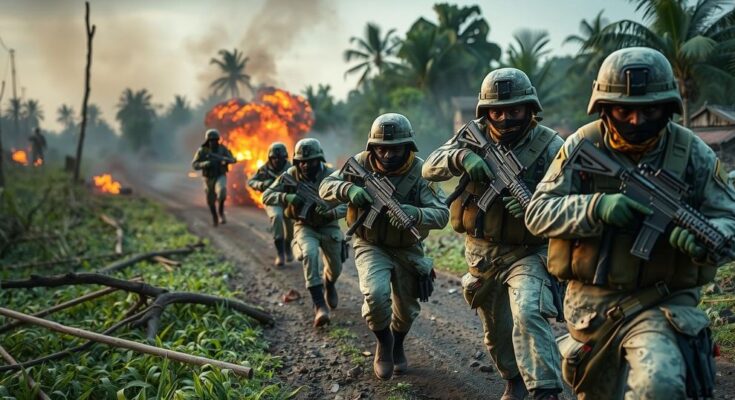Rwanda-backed M23 rebels have captured the eastern town of Masisi, further escalating the conflict in the Democratic Republic of Congo. The insurgency, which has reignited since 2022, has led to serious territorial losses for the Congolese government and humanitarian crises affecting millions. Diplomatic efforts to resolve the conflict have stalled, leaving local populations in a precarious situation.
On Sunday, local politicians reported that Rwanda-backed M23 rebels have captured the strategic town of Masisi, located approximately 80 kilometers from Goma, in the eastern region of the Democratic Republic of Congo. This insurgency, which has intensified since its resurgence in 2022, has escalated tensions, with accusations directed at Rwanda for providing military support to the M23 group. M23’s recent advances further complicate the already fragile peace efforts amid ongoing violence and territorial disputes.
Alexis Bahunga, a member of the provincial parliament, stated that “The government will take measures to restore state authority over the entire territory.” Meanwhile, other political figures acknowledged the current control of Masisi by the rebels, underscoring the unstable situation. Fighting has continued, contradicting previous ceasefire agreements, and a planned high-level meeting between the Congolese and Rwandan leaders was postponed, which dampens hopes for a resolution to the conflict that has displaced over 1.9 million individuals in recent months.
The leader of the anti-government Congo River Alliance, Corneille Nangaa, indicated that M23 had reached the center of Masisi. The humanitarian situation in Masisi has become dire, as local international organization staff have expressed their inability to operate effectively with businesses closing and fear of an impending counteroffensive by Congolese forces. Such developments reflect the urgent need for concerted efforts to manage the ongoing conflict and the resulting humanitarian crisis.
The renewed insurgency of the M23 group in eastern Congo stems from longstanding ethnic tensions and political instability in the region, particularly among the Tutsi population. Since its formation, M23 has been involved in several conflicts, often linked to regional dynamics involving neighboring Rwanda. The international community and humanitarian organizations are increasingly alarmed by the humanitarian impact of the violence, with millions displaced and in dire need of assistance. The complexity of the situation is compounded by accusations of foreign intervention and the failure of diplomatic efforts to establish lasting peace. The situation remains dynamic, with ongoing military actions and the precarious nature of ceasefire agreements further complicating the political landscape.
The capture of Masisi by M23 rebels signifies a significant escalation in the ongoing conflict in eastern Congo, exacerbated by alleged foreign support and the inability of local authorities to regain control. As fighting continues, international observers urge for renewed diplomatic negotiations to address the humanitarian crisis exacerbated by the violence. The region faces a critical juncture necessitating immediate and coordinated response to halt further destabilization and aid displaced populations.
Original Source: www.usnews.com




